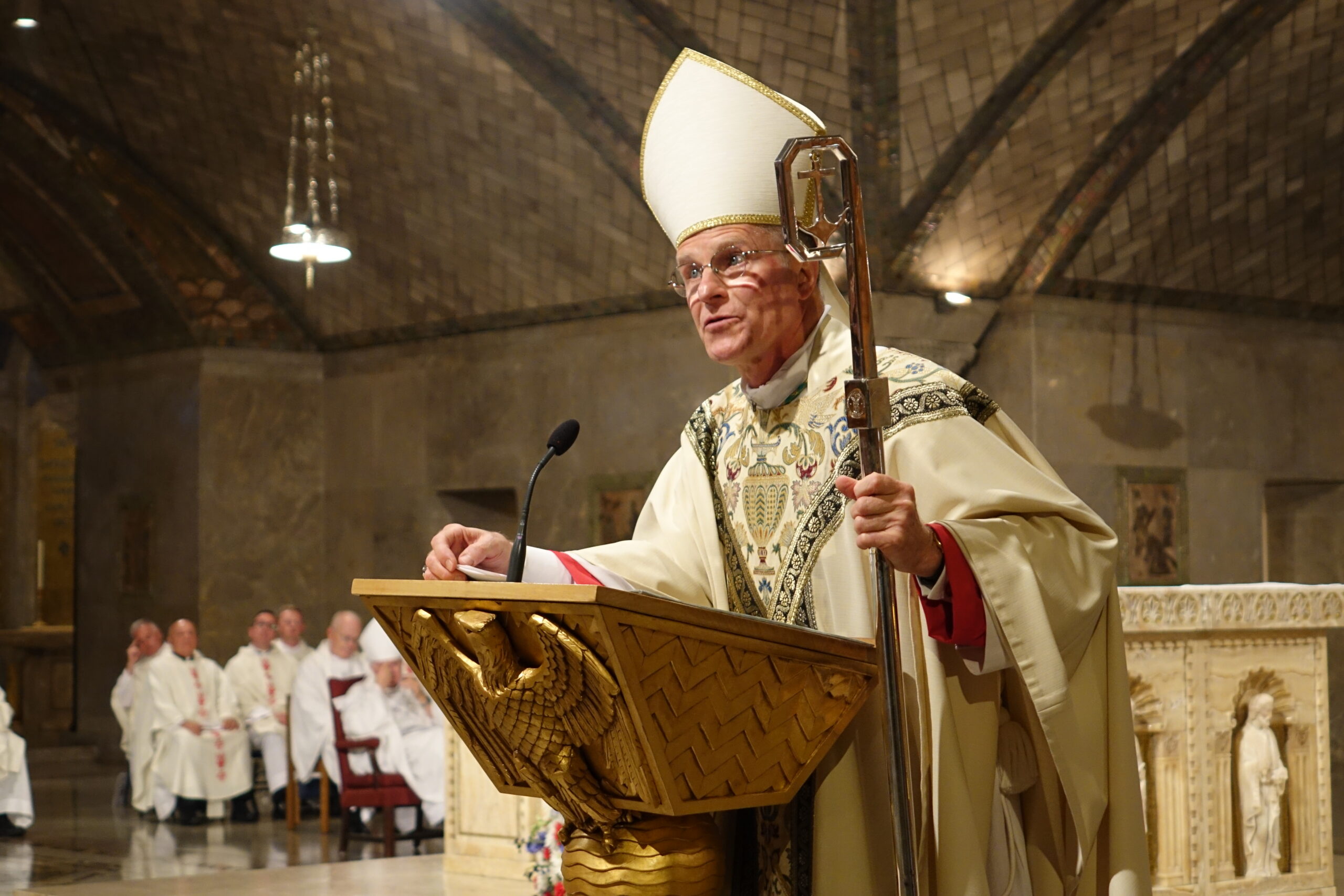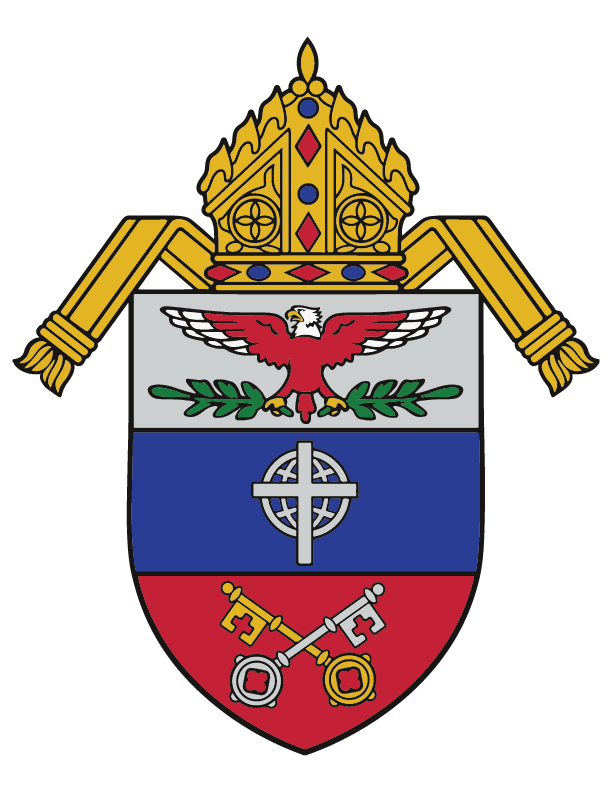
WASHINGTON, D.C.—Vietnam War hero Father Vincent R. Capodanno, M.M., (1929-1967), a Catholic U.S. Navy chaplain killed in action while supporting Marines under enemy gunfire, could well serve as a good example for the Church as it deals with the abuse crisis, according to the Archbishop for the Military Services, USA. His Excellency, the Most Reverend Timothy P. Broglio, J.C.D., made that observation in his homily last night at a memorial Mass for the slain priest on the 51st anniversary of his death in combat. “He cared for the vulnerable,” Archbishop Broglio said, “because the Marines were under attack. He imitated his Lord by giving his life so that others might live.”
An estimated four hundred turned out to pray for the much loved Servant of God and heard Archbishop Broglio’s homily at the annual memorial Mass in the crypt church of the Basilica of the National Shrine of the Immaculate Conception. The congregation included members of Father Capodanno’s extended family, active-duty and retired servicemen and women, and midshipmen from the U.S. Naval Academy. Dozens of military chaplains, clergy of the Archdiocese for the Military Services, USA, (AMS), and other priests joined Archbishop Broglio at the altar to concelebrate the Mass.
Father Capodanno, a Maryknoll missionary and Navy lieutenant from Staten Island, NY, died in of multiple gunshots in Vietnam’s Que Son Valley as he moved fearlessly around a live battlefield—unarmed—administering the sacraments to embattled U.S. Marines, encouraging those waging the fight, and pulling the wounded to safety. In January 1969, Father Capodanno posthumously received the Medal of Honor—the nation’s highest military decoration—and in May 2006, the Catholic Church declared him a Servant of God, formally initiating his Cause for canonization. The AMS is the Promoter of the Cause. Last year, a special tribunal appointed by Archbishop Broglio to look into the case completed its inquiry and sent its findings to the Holy See’s Congregation for the Causes of Saints, which will decide whether to let the Cause go forward to the next stage of consideration.
Here follows the full text of Archbishop Broglio’s homily:
Forty years ago the daughter of a woman to whom I brought Holy Communion every first Friday called to say that her mother was close to the end of her pilgrimage. She could no longer consume a host. I decided to bring her the Precious Blood. It so happened that the other Associate Pastor was around and so after the 11:00 Mass I drove while he held my chalice.
We went to the home and I led the prayers for the Viatecum, the food for the final journey. When I held that chalice with straw so that she could receive Our Lord one last time, she looked with an expression of serenity in the midst of her pain. She smiled and I will carry that image of her countenance with me for the rest of my life. She took her food for the final journey and died a day or two later.
We hope in eternal life and we want to make the journey accompanied by the Lord who nourishes us. How many times has a Catholic chaplain like Father Capodanno offered that food for the journey as he preaches the truth in love?
In the Gospel this evening Jesus invites His hearers into deeper union with Him and indicates the way to do just that. We must partake of the Bread of Eternal Life, if we hope to achieve our goal, eternal happiness in union with Almighty God. Did you notice that Jesus insists twice on this necessity, even in the face of the disbelief of His audience? He uses very graphic expressions to make clear that we are to eat His Flesh and drink His Blood. There is no mere symbol here. He will not compromise His dramatic realism to please the crowd. They can and some do walk away, but the message remains. Even in the history of the Church, this clear teaching of the Lord Jesus has been a source of separation and denial. However, the Church has consistently resisted all attempts to turn Eucharistic presence into something vaguely symbolic or metaphorical.
Entering into sacramental communion is already to obtain Eternal Life, life in communion with God, in His love. We know this truth, but it is good for us to meditate upon it and to reaffirm our faith so as to hunger for the Eucharist. One of the reasons for the eucharistic fast, even though now only one hour, is to create a physical hunger to remind us of our spiritual hunger for the Eucharist.
Many of those who serve or have served in the military know about that hunger from your experience of deployment or being on a ship without a priest. That inability to participate in this life-giving sacrament challenges us and makes us appreciate what the Lord gives us.
Father Capodanno knew about that need when he met Marines in Hong Kong and it contributed to his decision to request the Navy chaplaincy so as to serve his Marines in Vietnam. His impact on those he served is remembered by so many of you who were with him and were comforted by his ministry.
Jesus has become our brother by taking up our human nature to transform it into a means of communicating eternal life. The Eucharist allows us to enter the new covenant, which is an intimate relationship with Him in a reciprocal depth. Holy Communion “makes the human being divine by inebriating him, as it were, with divinity.” “He who eats my flesh and drinks my blood dwells in me and I in him.” It is impossible to imagine a more intimate union than that.
We consider the dynamic aspect of Eucharist: a profound relationship with Jesus which orients our whole life. Jesus’ life was completely oriented to Father. If we partake of Communion with open heart, we seek to accomplish work of Jesus and to glorify Him and through Him the Father. Henri Nouwen reminded us: “God does not only want to enter into human history, converting Himself into a person who lives in an epoch and in a specific country, but also wants to be our daily food and drink in every time and place” (Henri Nouwen, La forza della sua Presenza, pp. 61 ff.)
We look for signposts on that journey to the fullness of life. Father Capodanno is one of those missionary disciples who recognized the Lord Jesus in those who needed him. He sought to protect those who were in danger or uncertain. He exemplified the description that Pope Francis offers of a military chaplain whose role “is to accompany and support [the military] ..on their journey, to be a comforting and brotherly presence for them all. You can pour upon these people’s wounds the balm of the Word of God which alleviates suffering and instils hope; and you can offer them the grace of the Eucharist and of Reconciliation, so as to nourish and regenerate the afflicted soul.” (Pope Francis, Discourse to 4th Course to Military Chaplains, 26.X.15.)
Father Capodanno wrote some notes about trying to give meaning to the mystery of death. Perhaps they are notes for a funeral homily or a memorial service. “At an event such as this, willingly or no, consciously or no, our minds grope amid the tragedies and complexities of life looking for an answer. It is with hesitation that we accept the fact: There is no easy answer, there is no glib answer. We are human beings and our view and our knowledge are limited because of our human limitations. We gradually realize we must face these events with Faith in God. Knowing that somehow they work for the good of the persons involved. We cannot fully comprehend how but only that they do.” (As quoted in Stephen M. DiGiovanni, Armed with Faith, p. 138.)
The prophet Isaiah reminds us that the Lord destroys the final enemy, death, and holds out hope for all of us who move forward. We cling to this hope as we move forward to the fullness of life. We are continually challenged by a world that concentrates very much on this life and particularly on making certain that each person buys what he or she needs for happiness.
Yet still we are attracted by very counter-cultural figures: a St. Teresa of Kolkata, Bl. Stanley Rother, and Father Capodanno. They were much more interested in giving and in caring for others than they were in taking care of themselves or buying things.
We gather this evening to pray for the repose of the soul of Father Capodanno, but also, because we want his example to become known and, more importantly, followed. We want young priests to consider serving the men and women who serve and their families. We want to be touched by that spirit of self-sacrifice that motivated the Servant of God’s decision to stay with his Marines in the heat of battle. We desire that charity in action that makes me set aside the imperial and authoritative me in order to protect another and be there for him or her.
We cannot deny that Father Capodanno in the Que Son Valley preached his most eloquent sermon. He announced the truth in love by his selfless gesture to minister to those in his care. He cared for the vulnerable, because the Marines were under attack. He imitated His Lord by giving his life so that others might live.
His example is a good one for us as a Church, because we must also assess how best to protect young people, children, and the vulnerable in our believing communities and beyond. As we, bishops, priests, and believers revisit the abuse crisis of the last century, we must learn from the courage of the Servant of God. He had no questions about the place of virtue and the defense of those in his care. He was armed with his faith and fortified with the Eucharist.
The mother who received Holy Communion shortly before she died was comforted on her final journey. She recognized the real presence of the Lord. The Marines comforted by Father Capodanno fifty-one years ago today saw in him a concrete sign of God’s love and protection. We can only give thanks and pray for the grace of imitation.
